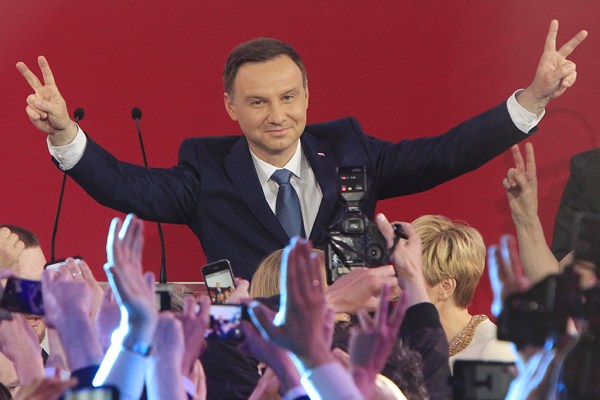The surprise election of Andrzej Duda, a charming, relatively unknown, conservative 43-year-old lawyer, to the Polish presidency Sunday over the popular but low-key incumbent, Bronislaw Komorowski, has sent shock waves through Europe, raising fears of a radical change in the politics, economics and foreign policy of an increasingly important European Union member. The Duda revolution may take months to materialize, since the Polish presidency is not particularly strong and parliamentary elections in the autumn will reveal whether voters return his Law and Justice Party to power for the first time since 2006. Yet the depth of change Duda represents has Europe on edge, given his economic populism, Euroskepticism and hawkish foreign policy views on Russia.
Poland’s economy is one of the strongest in Europe and a leader among the Central and Eastern European EU member states, so any change in economic policy alone would come as a major shock. Duda campaigned on a populist, right-wing economic platform that drew heavily from the playbook of the controversial Hungarian Prime Minister Viktor Orban. He slammed liberal economic policies for creating great gulfs of inequality, in effect creating a fast-growing economy that did not benefit working-class Poles. He pointed to low wages, high unemployment in some parts of the country, high levels of economic emigration, excessive foreign ownership and a fraying social safety net as ills to be corrected. Duda won large majorities in the rural areas of Poland, where average incomes are as little as one-fourth of those in prosperous cities like Warsaw, Krakow and Wroclaw.
Duda advocated several policies pioneered by Orban in Hungary, such as forcing banks to convert Swiss Franc mortgage loans into the local currency, the Polish zloty, imposing stiff taxes on foreign banks and retail chains and developing domestic capital. He also proposed reversing an unpopular increase in the retirement age to 67 and delaying entry into the eurozone. For Poland, the post-communist country most associated with free market economic reforms over the past 25 years, the prospect of a shift toward economic populism alone would have massive repercussions. However, as the president does not control economic policy in Poland, these changes will have to wait until at least after parliamentary elections expected in October.

